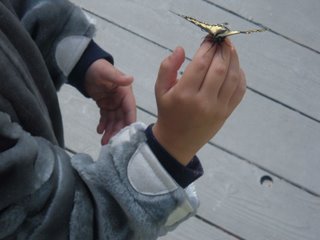 One of the best is positivity, the ability to change.
One of the best is positivity, the ability to change. I'm not so sure why positive, happy experiences are regarded by most people in this culture as being so... banal? Why is negativity sensationalized? If someone does not understand the motives of a mystery, why do they so quickly assign the most negative explanation for the other person's motives? We must be wired to be paranoid, because it's so common in our culture, or at least the one I know.
It seems to me what is deceptive here about experiencing virtual drama is that it desensitizes all sensation. Your sensitivity in general eventually gets dulled, unless you know how to sharpen it. The danger is you might not recognize the subtle beginnings of potential happiness. You begin to assume that what will make you happy has the same intensity level as the excitements of (virtual) negativity. Once you can only recognize intensity, it's easy to forget that happy experiences are subtle. It may take some time to recognize that you do like something or enjoy doing it.
Opposites are a concept of our culture. They don't really exist, as far as I can see. Each thing is just - what it is, not opposite something else. Culture says that if you feel something intense, it's opposite is a direct match. This is a seriously self-deceptive assumption that robs people of recognizing what can make them happy. This desire for intensity has seeped into the way people talk. You don't need to use implied opposites used to illustrate your point, but many people use them as exclusive examples.
There's more reasons that this use of language is a problem. It encourages misunderstanding almost as bad a using a cliche to talk about something. It also has the effect of creating positional arguments when there are none. This comparison of opposing characteristics is a very common activity that contributes to misunderstanding and positional arguing. Using opposites is an expression of a temporarily divided examples, an expression of an artificially divided self. We do it when we talk, it's very common. We have to work really hard to NOT do it. (See, I did it there. I could have said it takes a great deal of effort to both interrupt your own habit of stating something in the negative AND in the next moment come up with another creative response.)
The worst trouble with statements that claim their value by using an implied opposite is that everybody has assigned a different opposite to the one you imply. You don't communicate unless you can somehow read each other's mind.
Many times, when looking for an instance, people habitually go to the extreme to illustrate their point. Life isn't often that neat and obvious. It turns out that generalizations, such as what constitutes "opposite," can be very slimy communication tools.
 It's a bit like a parent giving a toddler two things to choose from; the intent is to give the kid the idea that they have the ability to make their own decisions. The "twick" is (as my four year old friend Adam once said) to be able to think of a completely different choice that has another set of choices that answers both his parent's perference and what he might want. Pretty good for a little kid, huh?
It's a bit like a parent giving a toddler two things to choose from; the intent is to give the kid the idea that they have the ability to make their own decisions. The "twick" is (as my four year old friend Adam once said) to be able to think of a completely different choice that has another set of choices that answers both his parent's perference and what he might want. Pretty good for a little kid, huh?
No comments:
Post a Comment